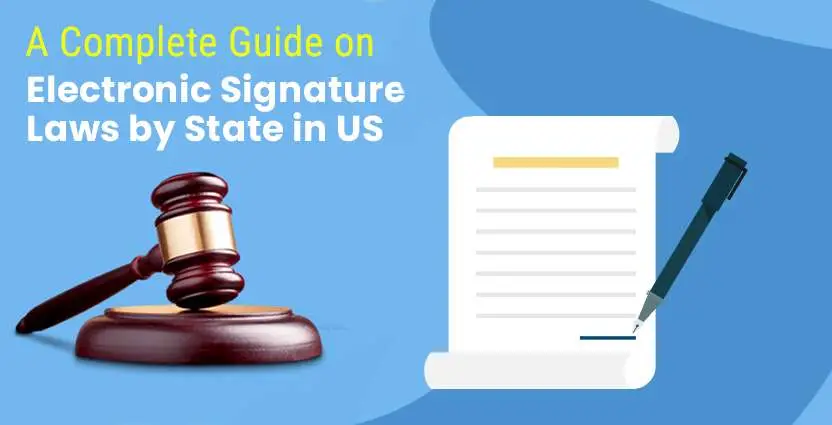A Complete Guide on Electronic Signature Laws by State in US

Electronic signatures have become an indispensable aspect of our quotidian existence, facilitating individuals to authenticate documents, agreements, and contracts irrespective of their geographical location or the hour of the day. Electronic signature laws in US are regulated by both the federal government and state laws, which oversee their usage. In this write-up, we present a comprehensive analysis of the laws governing electronic signatures in the US states and beyond.

The Modern Way to Sign Documents – Electronic Signature
Revamp your document signing process with WeSignature, the premier electronic signature solution for small businesses. Not only does WeSignature enable you to sign documents in a flash, it also guarantees legal compliance, optimal productivity, and cost-effectiveness. With its state-of-the-art features and intuitive user interface, WeSignature is the ultimate solution for streamlining your document signing procedures. Don’t hesitate any longer – adopt WeSignature now and experience the difference.
Electronic Signature Laws by State
Variations in State Laws
The ESIGN Act establishes a fundamental standard for the utilization of electronic signatures in the United States. Nevertheless, individual states have the prerogative to establish their own legislation governing electronic signatures. Consequently, there are inconsistencies in the regulations and prerequisites for utilizing electronic signatures from state to state.
For instance, some states mandate specific technological requirements for the use of electronic signatures, while others necessitate a particular method of disclosure for electronic signatures.
Understanding State-Specific Requirements
To ensure the validity of an electronic signature, it is imperative to familiarize oneself with the particular prerequisites for electronic signature usage in the state. Disregard of such requirements may lead to the nullification of the electronic signature’s enforceability.
Among the typical state-specific conditions are the specific technological modes for executing electronic signatures, the mandatory protocol for disclosing electronic signatures, and the techniques for authenticating the signatory’s identity.
Electronic Signature Laws by State Comes Under ESIGN and UETA
ESIGN and UETA are legal statutes implemented in the United States that offer provisions for the use of electronic signatures, records, and agreements in commerce. ESIGN confers a binding legal effect to electronic signatures, while UETA provides a consistent and standardized legal framework for electronic transactions. These laws effectively expedite and streamline e-commerce by making transactions swifter, more expedient, and economically feasible.
The Electronic Signatures in Global and National Commerce Act (ESIGN)
The Electronic Signatures in Global and National Commerce Act (ESIGN) was enacted by the United States Congress in 2000. Its aim is to advance the use of electronic signatures, records, and contracts in both domestic and international commerce, and to give these electronic documents the same legal status as their paper-based equivalents.
A fundamental element of ESIGN is the acceptance of electronic signatures as legally binding, subject to certain conditions. The signatory must have assented to employ an electronic signature, and it must be distinctive to the signatory and connected to the document it is signing. Moreover, the signatory must be able to retrieve the document and signature at a later time.
ESIGN is significant because it supersedes state laws that conflict with its provisions. Consequently, even if a state has its own laws regarding electronic signatures and contracts, these laws must conform to the provisions of ESIGN for them to be considered valid.
ESIGN allows for electronic signatures in various transactions, including the trade of goods and services, fund transfers, and contract executions. This can reduce transaction time, increase convenience, and decrease expenses, as it eliminates the need for physical signatures and paper-based documents.
Uniform Electronic Transactions Act (UETA)
The Uniform Electronic Transactions Act (UETA) is a pioneering piece of legislation that has paved the way for a more streamlined and efficient approach to conducting transactions in the digital era. Enacted by 47 states, the District of Columbia, and the U.S. Virgin Islands, UETA presents a uniform legal framework for the establishment and utilization of electronic records and signatures disclosure, and is acknowledged as legally binding electronic signatures.
Nevertheless, UETA goes beyond merely acknowledging electronic signatures. It also covers the use of electronic records in a broad range of transactions, such as the vending of commodities and amenities, the transfer of funds, and the implementation of contracts. This permits faster and more expedient transactions that economize time and diminish costs related to paper-based procedures.
One of UETA’s principal advantages is its capacity to adjust to the quickly evolving technological environment. The act is adaptable enough to embrace new modes of electronic signatures and electronic records, certifying that it remains relevant even as technology progresses.
Another significant element of UETA is its defense of the rights of customers and companies in electronic transactions. The act mandates that electronic transactions be joined in voluntarily and with the concurrence of all implicated parties, and that electronic records be effortlessly accessible and precisely reflect the terms of the agreement.
List of Electronic Signature Laws by State
The Importance of Electronic Signature Laws
Protecting the Validity of Electronic Signatures
Electronic signature regulations aim to safeguard the authenticity of electronic signatures and warrant their legal efficacy. These legislations prescribe the guidelines for the creation, disclosure, and retention of electronic signatures, thereby equating them to the customary handwritten signatures. By instituting an explicit framework for the adoption of electronic signatures, these laws curtail the likelihood of conflicts and affirm the parties’ confidence in the legitimacy of the electronic signature.
Encouraging the Adoption of Electronic Signatures
Electronic signature laws not only safeguard the authenticity of electronic signatures but also serve as a catalyst for the acceptance of such signatures. These laws establish a clear and consistent legal structure for the use of electronic signatures, instilling confidence and assurance in individuals and organizations to adopt this new technology. The availability of free electronic signature services has further amplified the prevalence of electronic signatures by facilitating effortless adoption of this innovation.
Challenges with Electronic Signature Laws
Keeping Up with Technological Changes
Electronic signature laws pose a formidable challenge, as they struggle to keep up with the swift pace of technological advancements. With the constant innovation of new methods to create and authenticate electronic signatures, the laws struggle to remain relevant. This can create an air of confusion and uncertainty, especially regarding the legality of certain forms of electronic signatures.
Seeking Professional Advice
Seeking expert guidance is an alternative approach to surmount the obstacles posed by electronic signature laws. Collaborating with a legal counsel or a specialist knowledgeable in the realm of electronic signatures can ascertain that you are in full compliance with the pertinent statutes and regulations, thus curbing the risk of potential disputes and affirming the legality and enforceability of your electronic signatures.
Utilizing Compliance Tools
Utilizing resources and tools for compliance is an alternative approach to overcome the obstacles presented by electronic signature laws. Several options are at one’s disposal, such as software and services, that may aid in guaranteeing conformity with the applicable legal guidelines and regulations. By automating the process of electronic signature generation and validation, these tools facilitate efficient compliance with real-time updates on the newest requirements and protocols.
The Future of Electronic Signature Laws
Harmonization of State Laws
In the foreseeable future, it is probable that the discrepancies in state-specific prerequisites shall be mitigated, as there is an escalating trend towards the amalgamation of state legislations. This would culminate in a more uniform legal system for utilizing electronic signatures across the United States, consequently facilitating individuals and enterprises in the employment of electronic signatures with certitude.
Advancements in Electronic Signature Technology
In addition to harmonization of state laws, advancements in electronic signature technology are also likely to shape the future of electronic signature laws. As technology continues to evolve, new methods for creating and verifying electronic signatures will emerge, which may require updates to existing laws and regulations. Keeping up with these advancements will be critical for ensuring that electronic signature laws remain relevant and effective in the digital age.
Digital Signature vs eSignature
What is a Digital Signature?
A digital signature is a form of electronic signature that leverages encryption technology to guarantee the legitimacy and incorruptibility of an electronic record. People commonly use digital signatures for secure transactions, such as online banking or financial transactions.
What is an eSignature?
An eSignature encompasses any electronic method used to sign a document, including digital signatures. It’s commonly used for less secure transactions such as job applications or rental agreements.
Legal Documents Accepted with Electronic Signature
Legal Documents that Can be Signed Electronically
You can electronically sign most legal documents, including contracts, agreements, forms, and even wills. However, some legal documents, such as a last will and testament, may require a traditional ink signature in some states.
Legal Requirements for Electronic Signatures on Legal Documents
When employing electronic signatures on legal documents, it is imperative to ensure that they are both legally binding and enforceable. This necessitates adhering to the protocols articulated in the ESIGN Act, as well as any state edicts that may be applicable. Furthermore, it is crucial to confirm that both parties have acquiesced to electronically sign the document and that the electronic signature is attached in a way that is distinct to the signatory and impervious to facile duplication or forgery.
Legality of eSignatures
Federal vs State Laws
Both federal and state legislation in the United States regulate the use of electronic signatures. The ESIGN Act delineates a blueprint for the deployment of electronic signatures in commerce taking place across state borders and beyond the country’s limits. However, certain states have enacted their own regulations that complement or adjust the ESIGN Act.
Electronic Record and Signature Disclosure
Under the ESIGN Act, organizations must present electronic records and signatures in a way that’s easily accessible to individuals asked to sign documents. As a result, it is essential to present the electronic signature in a manner that is uncomplicated to comprehend and readily accessible to the signatory.
Conclusion
To summarize, electronic signatures have become a vital aspect of our daily routines, furnishing us with a practical, effective, and eco-friendly approach to signing and dispatching documents. Whether you are an individual or an enterprise, electronic signatures proffer a wide range of benefits, including enhanced efficiency, reduced costs, and improved ecological sustainability.
It’s crucial to understand the requisites and directives for using electronic signatures in a legitimate and enforceable manner, as both federal and state laws in the US regulate these laws. The era of dealing with papers and searching for writing tools is now history, since electronic signature services have bestowed us with the ability to smoothly switch to a online handwritten signature lifestyle and enjoy the benefits of this contemporary convenience.
FAQs – Electronic Signature Laws by State
1. What are electronic signature laws in the United States?
Electronic signature laws in the US, such as the ESIGN Act and UETA, make electronic signatures legally valid and enforceable, giving them the same effect as handwritten signatures.
2. Are electronic signatures legally binding?
Yes, electronic signatures are legally binding in most US transactions if there is intent to sign and both parties consent to use electronic records.
3. What does the ESIGN Act do?
The ESIGN Act ensures that electronic signatures and records cannot be denied legal effect solely because they are electronic, provided specific consent and disclosure requirements are met.
4. What is the difference between ESIGN and UETA?
ESIGN is a federal law giving legal validity to electronic signatures nationwide, while UETA is a state law adopted by most states with similar provisions on electronic records and signatures.
5. Are all documents allowed to be signed electronically?
Most documents can be signed electronically, but some exceptions like wills or certain family law agreements may still require a handwritten signature.
6. How do electronic signature laws protect consumers?
Electronic signature laws require consent, clear disclosures, and record retention, ensuring that signers understand what they are agreeing to and can access signed records later.
